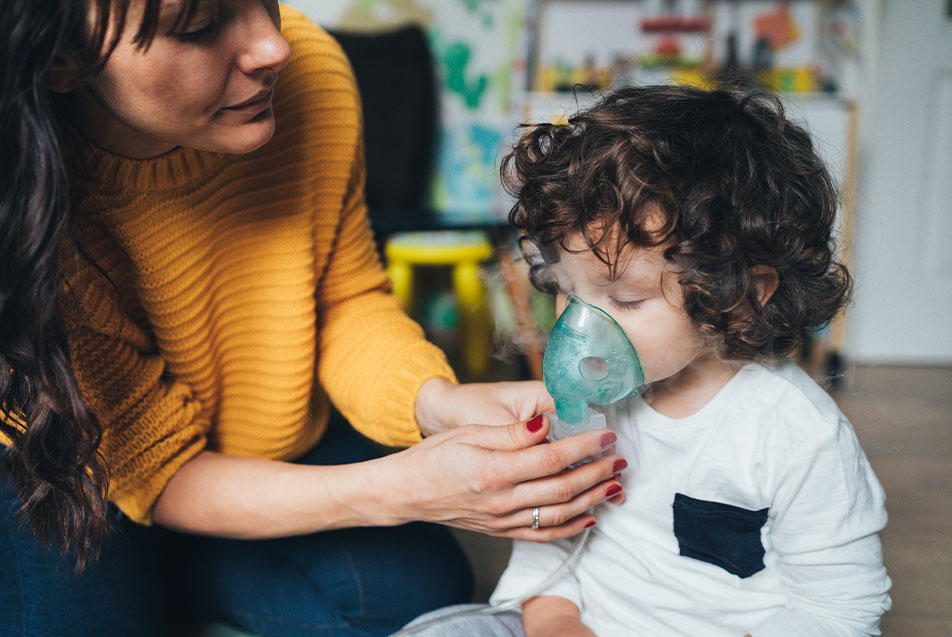
Caring for and raising a child with cystic fibrosis can be overwhelming. It is a disease that encompasses and affects several facets of your child’s life. Denise Gilham, NP, PPG - Pediatric Pulmonary & Critical Care, explains what cystic fibrosis is, available treatment options and what life looks like for children living with the chronic disease.
What is cystic fibrosis?
Cystic fibrosis (CF) is a progressive disease of the lungs, pancreas and other organs. Any organ that secretes mucus tends to be affected by CF. Individuals with CF have a mutation in the cystic fibrosis transmembrane conductance regulator (CFTR) gene, causing the CFTR protein to become dysfunctional. When the protein fails to work correctly, it cannot move chloride or sodium to the cell surface, making mucus and secretions too thick and salty.
In the lungs, for example, the mucus becomes trapped. It’s so sticky that patients have a hard time coughing it out. In the pancreas, enzymes can’t be secreted to digest food and, in the liver, the bile ducts get plugged due to the thick mucus, resulting in subsequent liver disease.
What causes CF?
CF is a genetic mutation carried by each parent. It takes two genetic mutations to have the disease. Individuals with only one copy of the defective or mutated CF gene are called carriers, but they do not have the condition. This means each time two CF carriers have a child, they have:
- a 25% chance the child will have CF
- a 50% chance the child will be a carrier but will not have CF
- a 25% chance the child will not be a carrier and will not have CF
Can CF be cured?
At the moment, there is no cure for CF. The science and the pharmaceuticals behind the disease have propelled astronomically in the last 10 years. There are medications called CF modulators that are correcting the dysfunction at the sodium chloride channel. This type of therapy doesn’t cure the disease, but it does help alleviate the sodium chloride dysfunction. Not all patients with CF, however, qualify for the medication. It depends on your genetic mutation as well as your age.
How is CF diagnosed, and at what age?
The gold standard for diagnosing CF is a sweat chloride level above 60. There is a range of sweat chloride between 30 and 60 that is considered indeterminate. We need to wait and watch for those children to see if they develop CF or continue to be in the indeterminate range. Ultimately, however, there are two ways to diagnose CF:
- Newborn screening: When your child is born, a newborn screening is done to identify any genetic abnormalities. Not all states do this screening, but Indiana identifies CF by utilizing the infant screening system. There are 1,700 mutations for CF, and the newborn screen in Indiana covers 43 of the most common mutations.
- Symptomology: If CF is not detected on a newborn screen, and you haven’t had a sweat chloride level check, then it’s based on the signs and symptoms exhibited by a patient. Typically, these characteristics are detected by a general provider, gastrointestinal physician or a pulmonologist. Usually, these are children who, throughout their life, have not grown well and have had frequent pulmonary infections. Diagnosis can occur at any point in time, but most kids, about 75%, are diagnosed by the age of two.
What are the symptoms of CF?
CF’s primary symptom is frequent lung infections due to a buildup of mucus because they cannot propel the secretion out. Most children also have persistent coughing and phlegm production because it is thick, sticky and difficult to expel from the lungs. Children with CF experience shortness of breath because they don’t have optimal oxygen and carbon dioxide exchange. They must breathe harder for their lungs to be more effective.
Poor growth and weight gain are other symptoms of CF due to a blockage in the pancreas gland that produces enzymes for the digestion of food. Because of the obstruction, digestive enzymes must be supplemented as well as vitamins A, D, E and K. Children with CF also have a higher rate of breathing, which results in more significant calorie expenditure. They typically need to ingest about 20% more calories than the average child to meet their basic caloric need for the day. Nutrition directly links to lung health, so it’s an absolute necessity that children with CF keep their BMI at or above the 50th percentile. Many children will also have greasy, bulky stools, in which they lose vital nutrients, which could result in corresponding liver disease or CF-related diabetes.
Does CF affect one gender or ethnicity more than the other?
CF is not linked by gender, but it is tied to ethnicity. Typically, the illness is found within northern European ancestry or Caucasian, but it does occur across all ethnicities. About 30,000 people in the US, both children, and adults, currently have CF.

What are the treatments for a child diagnosed with CF?
Treatments are very time-consuming. A child with CF must take an enzyme medication so their body can digest nutrients, which could be anywhere from 2-8 pills with every meal or snack. CF patients will also have to do inhaled nebulizer medications twice a day. They will also do a vest or percussion treatment twice a day. Vest and percussion therapies can take anywhere from 30-60 minutes per day twice a day.
Percussion therapy is used on children under the age of 18 months. Vest and percussion therapies both help the child propel secretions out of the lungs. Percussion requires a parent or caregiver to clap on the outside of the chest, both front and back. The vibration from the clapping technique helps dislodge the mucus from the lining of the airways, allowing the child to cough so they can propel those secretions out.
How does CF affect children's development?
It mostly affects their weight gain and linear growth or physical parameters of development. They have to consume so many extra calories. It’s challenging for a child to do that because they’re busy. They want to play instead of taking time to eat. Children with CF also don’t have optimal lung health, which affects their overall well-being. They can also be a little delayed on milestones simply because they don’t have a general feeling of wellness.
What are some common complications of CF in children?
One of the most significant complications is gradual lung decline. For this reason, it’s essential to maintain their lung health for as long as possible so that they can fight that rapid decline. Historically, lung decline was about 3-4% a year. With the new modulators and therapies, we’re taking steps in the right direction and making progress, but the fight against lung decline is a big one.
Can a child with cystic fibrosis live a normal life?
Absolutely! Many patients have gone on to finish high school, then college, get married, and even have children. We also strongly encourage them to play sports, dance or participate in physical activity with children who have CF because, just like any other person, the more physically fit you are, the healthier you are. It doesn’t have to be just sports, though. We also encourage singing or show choir, and even band or playing an instrument. These are all great ways to strengthen that thoracic cage and strengthen your inhalation and your exhalation. One of the added benefits of participating in any of these activities is that it mimics a vest or percussion therapy on the lungs, so it’s like getting extra treatment during exercise or extracurricular activities.
The one thing I’m always amazed by, though, is the dedication. Usually, as a parent, you might feel like you’re hounding your kids to do average things that a kid should do, but parents of children with CF have their kiddos complete 1-3 hours of additional care every day. Whether it’s oral medications, nebulizer medications or various therapies, it’s a tremendous time burden on both the patient and the parent. It takes a lot of devotion from the parent and patient to maintain a healthy lifestyle and make their lives and health a priority.
Are children with CF more susceptible to other illnesses?
Children with CF will catch a cold just like anyone else, but they aren’t more likely to catch a cold. The problem arises when they catch a cold because it can lead to a bacterial infection with the lung or sinuses and will require treatment. We recommend getting an influenza vaccine as a precaution.
Final thoughts
For this disease, the science and supporters, specifically the CF Foundation, have developed the most effective and promising therapies in research and technology for probably any of the genetically inherited diseases. All this research and clinical data gathered and implemented into practice have all stemmed from parents, patients, healthcare workers and researchers having a passion for finding a cure for this disease. It’s an exciting field to practice in, and it is incredible how much progress we have made in finding a cure for CF. We aren’t there yet, but it’s on the horizon.



